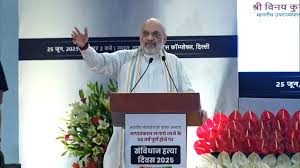Divine justice, Modi fought Indira’s dictatorial ideas, uprooted dynasty politics in 2014: Shah

Union Home Minister Amit Shah recently made a bold statement. He said Prime Minister Narendra Modi’s victory in 2014 was not just political—it was a form of divine justice. According to Shah, Modi’s rise marked the end of dynasty politics and stood firmly against the dictatorial policies once imposed by former Prime Minister Indira Gandhi.
Shah made these remarks during a speech in Madhya Pradesh. He aimed his message at both the Congress party’s historical missteps and its present-day leadership. His narrative tied India’s past struggles with its current direction under Modi.
Referencing the Emergency
Shah began by invoking the 1975 Emergency, one of India’s darkest political chapters. During that time, civil liberties were suspended, opposition leaders were jailed, and press freedom vanished overnight. He accused Indira Gandhi of trampling on the Constitution and silencing dissent.
“This country lived in fear. Democracy was under lock and key,” Shah said, directly referencing the Emergency years.
He then reminded the audience that Narendra Modi had actively resisted those authoritarian policies as a young political worker. “Modi opposed Indira Gandhi’s dictatorial mindset, not just then, but every step of the way,” Shah added.
2014: A New Era Begins
According to Shah, the 2014 election results represented more than just a change in government. For the first time in 30 years, a single party—BJP—gained an absolute majority in the Lok Sabha. This, he said, reflected the people’s rejection of family-run political parties.
“For decades, one family ruled over India. From Nehru to Indira, and then Rajiv, Sonia, and Rahul—the Congress leadership remained within one household,” Shah said.
He pointed out that Modi’s rise disrupted that pattern. “This is a man who came from humble roots and earned every bit of his success. It was a blow to dynasty politics. The people chose merit and service over inheritance.”
‘Divine Justice’ for India
Shah’s use of the term “divine justice” stood out. He didn’t simply frame Modi’s victory as a win for the BJP. Instead, he claimed it was a moral and spiritual correction of past wrongs.
“India has always stood for dharma, for righteousness,” Shah said. “What happened in 2014 wasn’t just democracy at work—it was divine will stepping in to restore balance.”
This idea isn’t new in Indian politics, but Shah’s framing gives Modi’s political career a mythical tone. It connects national sentiment with cultural beliefs, strengthening the BJP’s appeal among spiritually inclined voters.
A Stark Contrast With the Congress
Shah also took direct aim at today’s Congress leadership. He argued that even now, the party continues to promote family over ability.
“When leadership is inherited and not earned, democracy weakens,” Shah said. “Accountability suffers, and the system gets corrupt.”
In contrast, he praised Modi for climbing the political ladder from the grassroots. He emphasized how Modi served the public for decades without using family influence or shortcuts.
Preparing for 2024
These comments come at a critical time. With general elections expected in 2024, the BJP is already shaping its campaign narrative. Shah’s remarks are part of a broader effort to remind voters of the Congress party’s controversial past while portraying Modi as a democratic reformer.
The Congress, however, was quick to respond. Party spokesperson Jairam Ramesh dismissed Shah’s claims. “This is an attempt to rewrite history and avoid answering today’s real issues,” he said.
Still, Shah’s speech captured public attention. It blended historical memory with religious and political overtones—a strategy often used in election season.
Using the Past to Shape the Future
Political memory plays a major role in India. The Emergency, even after five decades, remains a symbol of unchecked power. Shah’s message aimed to keep that memory alive while positioning Modi as the opposite of what Indira Gandhi stood for.
“Indira ruled by fear. Modi leads by service,” Shah said. “The people chose a leader who understands their pain and doesn’t silence their voices.”
By making this comparison, Shah gave voters a clear choice between two models: one of top-down control and one of bottom-up leadership.
From Tea Seller to Prime Minister
Shah also reminded the crowd that Modi once sold tea at railway stations. That detail, often repeated by BJP leaders, serves to highlight his grassroots background. Shah contrasted it with the Congress party’s long history of privilege and entitlement.
“Modi didn’t inherit a party or a position,” he said. “He earned everything through hard work, commitment, and public service.”
This narrative resonates with many Indians, especially in rural and middle-class communities. It helps Modi connect with voters who see him as one of their own.
Conclusion: A Battle of Values
At its core, Shah’s message wasn’t just political—it was ideological. It framed Modi as a symbol of democratic strength, merit, and divine justice. At the same time, it portrayed Congress as outdated, elitist, and disconnected from the people.
Whether voters agree or not remains to be seen. But with election season approaching, the contrast between Modi and Indira Gandhi is likely to return to the center of public debate.
The fight, it seems, isn’t just about votes—it’s about which vision of India’s future will prevail.






